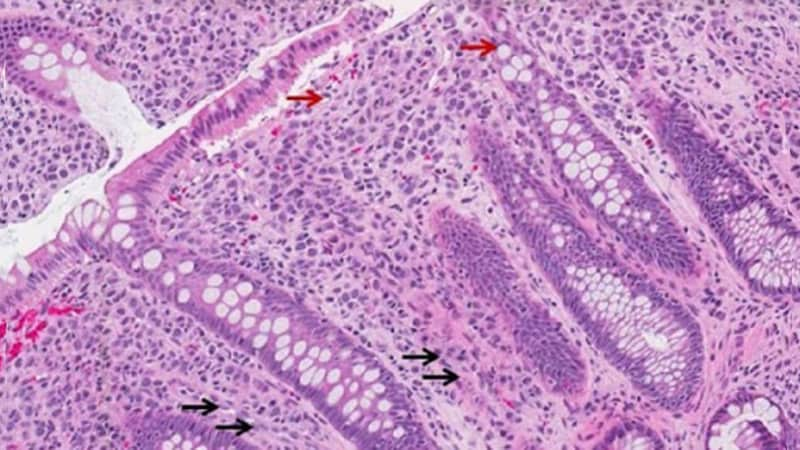BRCA is no longer the only gene that identifies hereditary breast cancer (BC) syndromes. Pathogenic variants of CDH1 identify a form of hereditary lobular BC (HLBC) that is unrelated to the better-known breast-ovarian syndrome linked to alterations in BRCA1 and BRCA2, according to a recent all-Italian study published in JAMA Network Open.
“Pathogenic or likely pathogenic germline CDH1 variants are associated with risk for diffuse gastric cancer and lobular breast cancer in the so-called hereditary diffuse gastric cancer [HDGC] syndrome. However, in some circumstances, LBC can be the first manifestation of this syndrome in the absence of diffuse gastric cancer manifestation,” wrote Giovanni Corso, MD, PhD, a breast surgeon at the European Institute of Oncology in Milan and a researcher at the State University of Milan and colleagues.
In the setting of the HLBC phenotype, “the overall frequency is not well established due to a lack of large, prospective cohort studies,” wrote the investigators. They analyzed women with LBC who met HLBC clinical criteria to evaluate the frequency of germline variants in CDH1, genomic inactivation in matched tumor samples, and disease-free and overall survival. “The BRCA1 and BRCA2 genes were also tested to verify a possible association (or exclusion) between CDH1 HLBC and the hereditary breast-ovarian cancer syndromes in these families,” they added.
A Long-Standing Project
Corso’s interest in CDH1 dates back a long time. “It all started during my PhD in molecular medicine and oncology that I did in Porto, Portugal, in a laboratory where this gene was being studied,” he told Univadis Italy. In 2007, Corso returned to Italy, where he identified the first germline mutation of CDH1 in gastric cancer in an Italian family in Siena. “Continuing my research, I noticed that some women with a pathogenic variant of CDH1 only developed lobular breast neoplasia, so I wondered if we were facing a new syndrome related to this gene, for which lobular breast carcinoma (and not gastric cancer) could be the first manifestation,” he continued.
These findings provided the idea of the project, which was funded by the Italian Ministry of Health in 2016. The results were published recently.
The study involved a single-center cohort of just under 5500 primary lobular breast tumors, of which 34.4% presented the hereditary phenotype. Tests for germline variants of CDH1, BRCA1, and BRCA2 were performed on 394 women, and the investigation identified 15 germline variants of CDH1 in 15 unrelated families.
“These women were selected based on specific criteria such as age
Implications for Practice
The overall frequency of CDH1 germline variants was approximately 4% and that of pathogenic or probably pathogenic variants was 1.5%. They were associated with an age ≤ 45 years at the time of lobular tumor diagnosis and a positive family history of BC. Somatic analysis showed structural alterations of the second hit of CDH1 as the main mechanism of HLBC tumorigenesis, suggesting future investigations for the definition of new therapeutic biomarkers, the authors wrote. They emphasized that in the case of HDGC, the main mechanism is methylation.
How do these results affect clinical practice? “Currently, we mainly rely on the clinical characteristics of the disease to decide whether to perform the test for identifying CDH1 variants in women with breast cancer, and there are no defined criteria for identifying the women to undergo the CDH1 test,” said Corso. “We hope that our results will provide a push to establish the possibility of performing the test following the criteria that emerged from the analysis: Very young women (age,
Corso also emphasized the importance of starting a specific program that includes gastroscopies for these women with CDH1 variants, for whom the risk for gastric cancer is not excluded. “CDH1, however, is only associated with lobular breast and stomach cancer, not with other organs, unlike, for example, BRCA, which has a more pronounced pleiotropy,” he said. Risk screening programs for relatives of people with pathogenic or probably pathogenic CDH1 variants should be considered, he added.
This story was translated from Univadis Italy, which is part of the Medscape professional network, using several editorial tools, including AI, as part of the process. Human editors reviewed this content before publication.
>>> Read full article>>>
Copyright for syndicated content belongs to the linked Source : Medscape – https://www.medscape.com/viewarticle/cdh1-linked-new-hereditary-breast-cancer-syndrome-2024a10009fr
